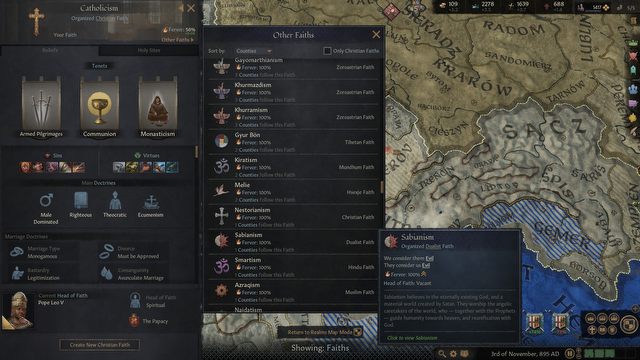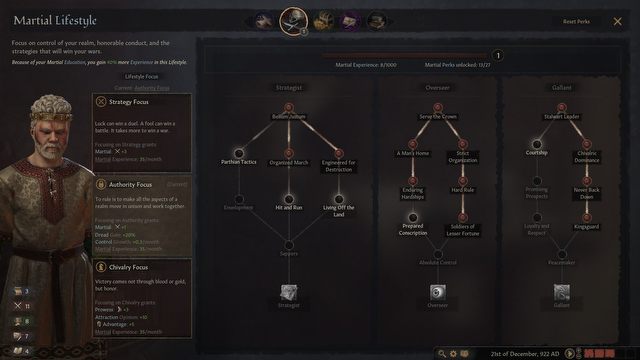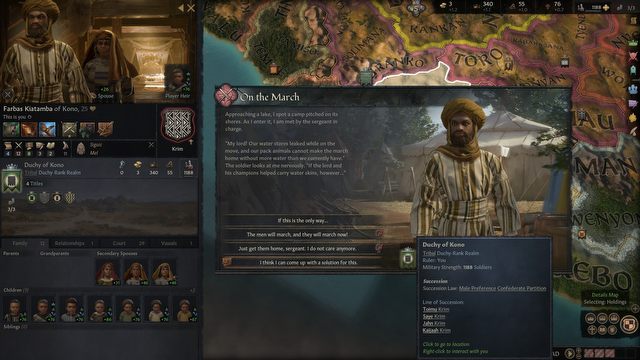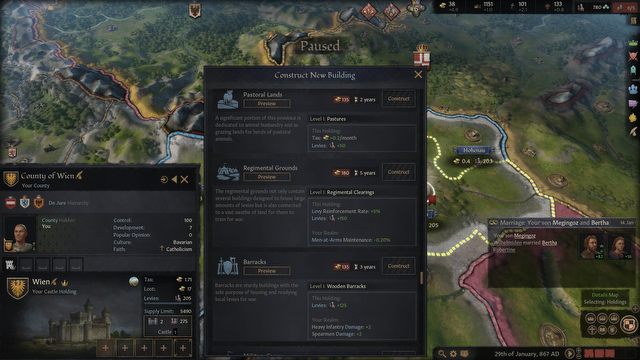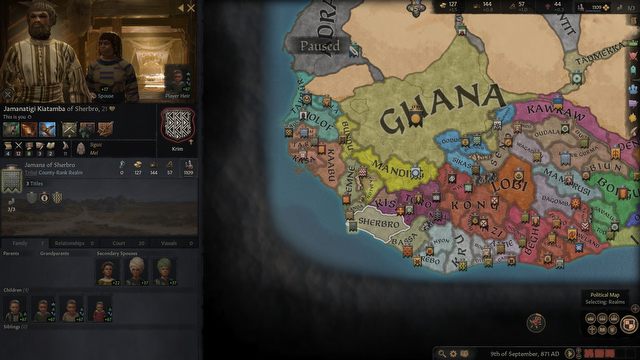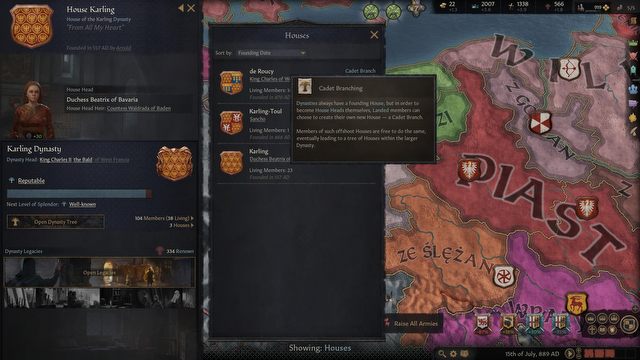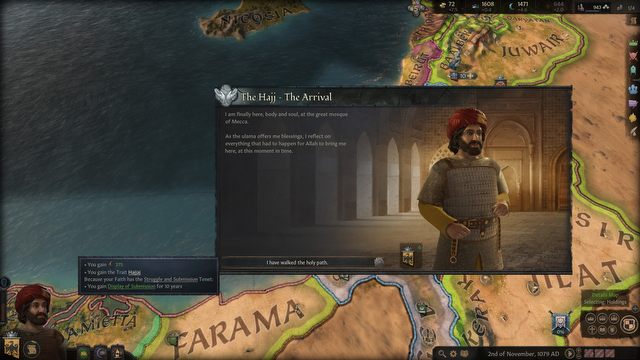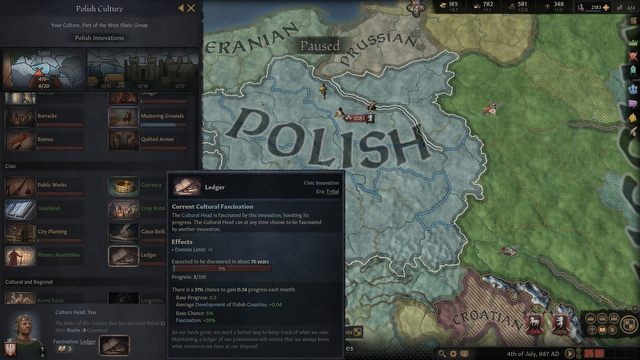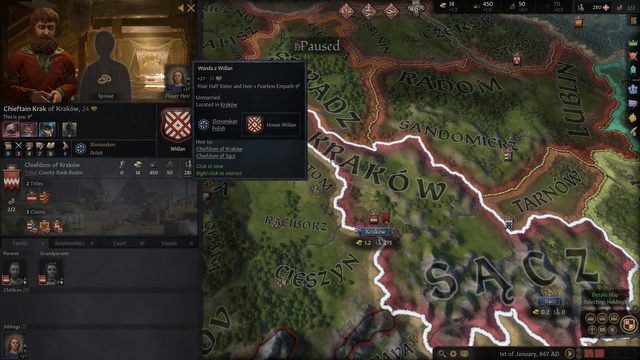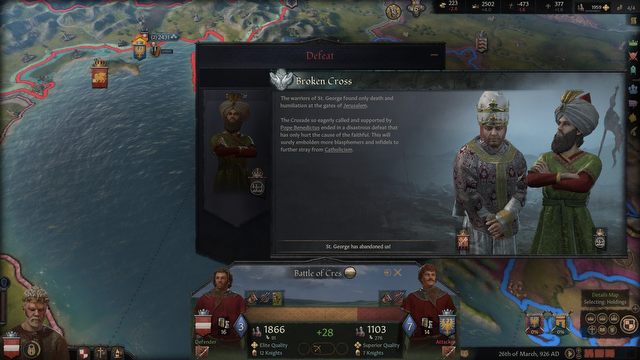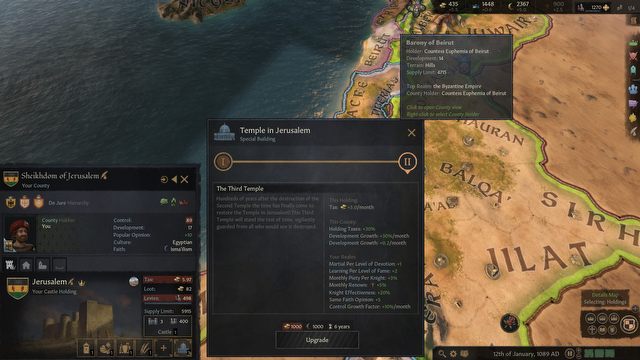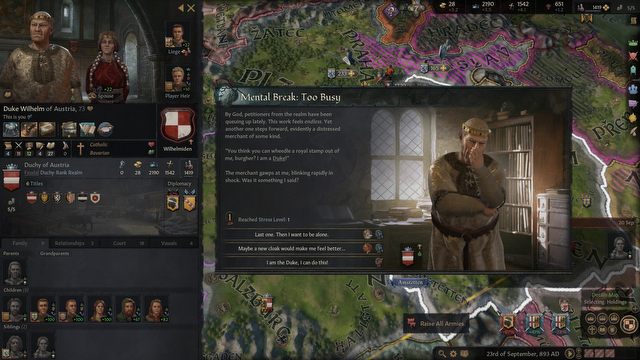author: Jacek Glowacki
Review – Crusader Kings 3 is a Game without Competition
The most complex simulator of a medieval ruler returns after more than eight years. It's an absolutely mighty game with two major drawbacks.
The review is based on the PC version.
The Crusader Kings series from Swedish Paradox has been the Avant Garde of medieval simulators for 16 years now, and as an original pairing of several genres (an extended RPG, RTS, a simulator of the life of a medieval ruler and dynasty) it's second to none. Truth be told, there's not much competition.
Crusader Kings is one of key games in the portfolio of the popular Stockholm-based developer and publisher. At the same time, it's said to exploit a terrible, according to many, micro-payments system. Subsequent DLCs, unlocking hidden parts of the map and some mechanics, and introducing new outfits are inevitably coming, but before that happens, let's take a look at how the newest iteration compares to the previous one game.
From Gibraltar to Kanyakumari
- excellent combination of RPG, medieval dynasty simulator and real-time strategy;
- successful changes to individual aspects of the game;
- endless possibilities – every game is different;
- graphics finally matching gameplay complexity;
- doesn't get boring.
- user interface to improve;
- deliberately cutting the game to sell more DLCs.
Crusader Kings III retains the spirit, philosophy and key gameplay mechanics familiar to fans of the series. We continue to represent our chosen dynasty and try to bring it to fame and glory through warfare, diplomacy, intrigue, mariages, murders, betrayals and alliances – for generations. Real Middle Ages! But – while the core of the game has not changed – the vast majority of aspects of the game have been redesigned from scratch.
Primarily, the developers allowed the game to begin at two different historical moments: in the year 867, or 1066. The map has grown considerably and covers all of Europe, Central Asia, much of Africa, the Middle East and the Indian peninsula. So, we have hundreds of Lords of various ointment and provenance at our disposal, which is a nice nod to players who had to buy a few CKII add-ons before they could enjoy a similar range of choice.
The geographical and political map also changed. There are more provinces, and each consists of several baronies, which (unlike previously) have capitals, as well as cities, centers of commerce, and places of worship. The improved graphics are not surprising, after all, more than eight and a half years have since Crusader Kings II was released. Army models, their animations, terrain elements and character images have also been improved, and it's all very easy on the eyes.
But as long-time fans of the series know, it's not about the graphics, it's about the mechanics. And here, there have been many changes that – although made with beginners in mind – don't really lower the entry threshold. Novices should start the game with an extended tutorial, set in Ireland (already called the "tutorial island" in the previous game). It does the job and manages to introduce you to the basics, but it will take at least a dozen hours to wrap your head around it all for real.
Waiter, there's an RPG in my strategy!
Once we've roughly understood what Crusader Kings are all about, we can choose a ruler. Each character was described with five key factors, or skills, that determine the effectiveness in a particular area. These skills include diplomacy, duels and warfare, management, intrigue, and learning. With age comes experience and various random events. And with them, dynamic changes in all aspects of life and new skills that we can choose from within three development trees belonging to each of these five main disciplines.
We can gain XP faster if we develop skills that were nurtured in the character when they were young. So, if you want a legendary fighter, make sure they prepare for it from the earliest age. In addition, characters have their own personality traits (both advantages and detriments), can assume various states (grief, melancholy, illness, etc.), and have friends, enemies, lovers of both sexes... simply: live.
And strategy in my RPG!
The player's goal is to make the dynasty he leads become the most powerful and influential on Earth. The way to achieve this is through conquest and titles. You need an army to wage war, of course. The structure of the armed forces in Crusader Kings III has evolved. The army is made up of regular, conscription fools, and elite troops, which we recruit and whose cost of living we constantly bear (light and heavy infantry, ranged and support units, and light and heavy cavalry, as well as units specific to a particular culture, such as camel riders) and knights.
Knights are the absolute elite of the army, so there are several, no more than several dozen of them – these are nobles with an indicator of valor, who stand at the head of the armed forces, participate actively in combat, and offer a range of skills useful in warfare, such as shorter siege times for enemy strongholds, or smaller losses during skirmishes. As in previous parts, we have no direct effect on the outcome of the battle – it's determined by the number of troops, quality of the professional troops, the skill and level of valor of the knights, and some field factors.
With conquests come new lands, and therefore honors: gold, fame, prestige, sometimes even piety – if we're at war with heretics and pagans – and above all titles: count, princely, royal, and even imperial. Crusader Kings III can recreate the Holly Roman Empire, finally create the Panslavic Kingdom of Great Lechia, or create a whole new political entity, but to do so, we need gold and prestige – and so the circle closes.
What do you think, love?
More titles mean more secular and ecclesiastical vassals in a complex feudal pyramid, and therefore more individual ambitions, conspiracies and, well, problems in general. Without delegating responsibilities, we will not go very far; in many cases we will be helped by advisers and – a novelty – a spouse. That's right – the significant other takes more importance by engaging directly with matters of power. The spouse will support us and assist, and will also work on the skills of our courtiers. Of course, marriage is also essential to have children, as we know – although it's possible to legitimize illegitimate offspring, it comes at the cost of prestige, of course...
Speaking of which. Prestige and piety return, but in a slightly different fashion than before. Both are necessary for declaring wars, creating new titles, recruiting troops, but also disinheriting descendants who do not fit our dynastic puzzle, and so on.
Prestige and piety are two novelties. The higher they are, the better the starting position of our offspring and the greater the respect among vassals and neighboring rulers. In addition, each character collects fame points, and the entire dynasty collects special points, through which the family can unlock one of the chapters of the dynasty's legacy – it takes ages to unlock them all, but each one offers bonuses to the family: in the field of war, diplomatic activities, even fertility or acceptance of marriage!
Marriage is the most important, though not the only, way to build a strong network of military alliances. It's good to bond with dynasties that follow the same religion and belong to the same culture, although it's not mandatory to obtaining the consent of the other party.
Amen
The religious aspect was greatly expanded. Beliefs are divided into religions (such as Christianity, Islam, Buddhism, etc.), and these in turn branch out into denominations: Catholicism, Orthodoxy or Nestorianism, for example (in case of Christianity). As a result, we get as many as 99 playable faiths, and each faction of faith has its own specificity, expressed through various dogmas, sins and virtues, sacred places or regulations concerning the definition of marriage, family, etc.
Furthermore, culture has replaced technology from the second game. In Crusader Kings III, the individual who controls most provinces with a dominant culture becomes the head of that culture (even if he or she represents another cultural circle) and has the right to decide what innovations that culture should develop. Innovations are divided into military and civil ones, and these, in turn, belong to different eras – from tribal institutions to mature Middle Ages. It takes years to unlock the innovations, but when it happens, the entire culture receives a certain bonus, such as the ability to modify vassal contracts, inheritance rights, as well as to erect special buildings, or construct new, more refined weapons. Some innovations belong only to a specific culture, such as the long Viking boats, and cannot be unlocked by anyone else.
Knife in the back
Relatively few changes have been done in terms of the intrigues. Still, the most important of these remains murder, followed by manipulations designed to increase sympathy our current hero, plus all possible romances, friendships, etc. The master spy will help you weave the most intricate plots, and if we manage to discover the secret of a character, we gain a leverage – small or large, it helps to blackmail such a character, in exchange for different benefits.
If you've been through all this description, you will surely realize how complex and nuanced Crusader Kings III is. The core game is enough for literally thousands of hours, as every game is considerably different, and the choices and dilemmas that we ponder over are endless.
Events related to our hero's skills, their relatives, personal traits and events that we have no direct influence on (for example, the death of a child) happen all the time, the characters struggle with stress that, if untreated, leads to a nervous breakdown, drunkenness, and even madness. The world of the game is roamed by characters that visit our court from time to time. They may join our ranks as valiant knights, a nice reason to declare war on our guest's claims to a certain title, a court medicus, or a great concubine who bestows upon our dynasty the desired hereditary qualities.
We can even establish our own chivalric order, a side branch of the dynasty to lead it, or immortalize our family in the prayers of priests, if only we are devout enough. I could go on like this for a long time, writing about how much geographical and cultural conditions affect the types of available buildings, how different systems of inheritance work, how to fight hostile factions, or what negative effects are brought with low control levels, why it's worth going on crusades against infidels, and so on.
The capabilities of Crusader Kings III could be written in thick volumes, but they're best experienced playing. The changes are almost universally welcome, and Crusader Kings III proves that Paradox Development is up to the task, even when it comes to listening to fans and implementing their demands. At the same time, the game has not lost the "magic" that has made it one of the most popular hybrid strategies. CK3 is therefore an overwhelmingly successful game, which, however, comes with its own burden of problems. In my opinion, there are two main drawbacks.
The drawbacks
The first one is user interface. Swedish UI/UX designers must have put quite some effort into making it easier for beginners to find bearings. One big assistance is a special window that conveniently lists all the most important information, letting you know if there are any things that require your attention. A new system of filter has also been introduced to make it easier to look at the population of the medieval world – for example, to find the perfect wife candidate for an heir. All things considered, we should point out the creators haven't managed to include the visual representations of all the in-game events.
There's always too many windows popping-up, obstructing the view and frustrating the attempts at controlling the kingdom. Some elements of the UI are too small, others to big, and misclicking is the usual. The characters' avatars seem to take a tad too much space, too. The avatars are a wild combination of various fonts, sometimes italics, other times in bold or in different colors. Many of the relevant concepts are written as hyperlinks, but instead of directly addressing key words in the game encyclopedia, we just have more windows appear on the screen. What's more, you have to wait a few seconds for the whole window to "load" – otherwise it will disappear when you move the cursor away. Veterans of the series will feel at home, but I can imagine that for complete novices, the system proposed by Paradox will be a nightmare.
The other problem is that this is quite clearly only the framework for an extensive promotion of DLCs; the vanilla will be filled with much more content. On the other hand, it's doubtless that the core game is much richer than the previous installment. This is pretty much what the second game looked like with the Sword of Islam, Legacy of Rome, Rajas of India, Way of Life, Conclave and the Old Gods expansions installed, but you can see how much more will be added at first glance.
There are a lot of events, but they happen to repeat a lot, and most of them involve stress relief. Events related to culture or religion are few and far between; for the moment, it's impossible to "feel" the uniqueness of each of these factors. It's easy to guess that there's a new counterpart to Jade Dragon coming – a set of new mechanics for China, the Carolinian era, as well as tons of new skins and music – the soundtrack is another thing that seems neglected. Whether we play a Slavic ruler, a Catholic count or a Muslim Sheikh, the songs don't change.
It is obvious to me that such decisions are not made in the designer rooms, however, but rather at corporate meetings. Still, the overall level of quality of this game, and the amount of research the devs must have invested, is truly commendable.
All in all, we have a very good, well-developed production that can't be boring, and which will be the reference point for the entire genre. At the same time, Crusader Kings III needs even more content and a number of tweaks to the UI in order to be considered a complete game. Of course, modders will be rebuilding CKIII off their own accord, adding a lot of content, but that's no excuse for the studio. With a fair business model, this would be an astonishing game.
ABOUT THE AUTHOR
Paradox games I love, and Crusader Kings holds a special place in my heart. I've spent more than 1000 hours in the previous game, and about 50 so far in part three.
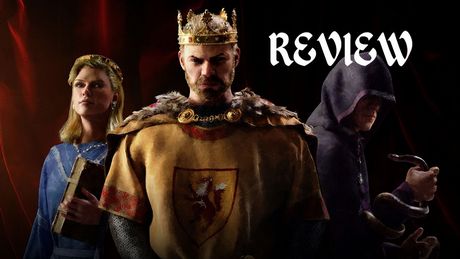
Review – Crusader Kings 3 is a Game without Competition
game review
The most complex simulator of a medieval ruler returns after more than eight years. It's an absolutely mighty game with two major drawbacks.

Cities: Skylines 2 Review - A Revolution, 2.0, or 1.5?
game review
Cities Skylines is finally back with its sequel after a whole eight years. Part two brings sweeping, quality-of-life improvements, but has the formula stayed relevant after almost a decade?

Pikmin 4 Review: A Delightful Bloom
game review
The fourth installment of the Pikmin series comes to life in a complete package that features something for everyone. It’s the best Pikmin game yet and one you should definitely check out.

